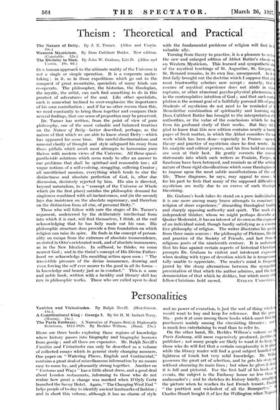Personalities
A Constitutional King : George I. By Sir H. M. Imbert-Terry. (Murray. 18s.) The Paris Embassy. A Narrative of Franco-British Diplomatic Relations, 1814-1920. By 'Beckles Willson.. (Bann: 2ris.) HERE are three books exploring those regions of knowledge where history passes into biography and -biography borrows from gossip ; and all three are expensive. Mr. Ralph Nevill's Vanities and Vicissitudes can only be described as a volume of eollected.essays which in general study changing manners. One paper on " Watering Places, English and Continental," contains a great deal of miscellaneous information by no means easy to come by, and pleasantly strung together. Another on
" Customs and Ways has a little about dress, and a good deal about London restaurants, informing to those who do not realize how great a change was marked when D'Oyly Carte launched the Savoy Hotel. Again, ." The Changing West End " helps people of to-day to identify ancient landmarks of fashion ; and in short this volume, although it has no charm of style
and no power of evocation, is just the sort of thing winch ( would want to buy and keep for reference. But the pia 18s.—puts it at once among those books which must find On purchasera 'mainly among the circulating libraries ; and is much less entertaining to read than to refer to. On the other hand, Mr. Beckles Willson's volume on T Paris Embassy, still more expensively produced, justifies Ih publisher ; not many people are likely to want it to keep.11 those who do will feel that a certain sumptuosity is in p1111' while the library reader will find a good subject handled 101 lightness of touch but very solid knowledge. Mr. 11111 possesses the great art of seleotion; and he gets his story t , without obscuring its main lines ; but when lie gives it deta it is full and pictorial. For the first half of his book. at events, the subject is the Embassy house no less than 81. ambassador's ; and he sketches its history briefly, ItinefifY,111 the picture when he reaches its last French tenant, Paull " the prettiest and wickedest of all the. Bonaparte's." Charles Stuart bought it .of her for Wellington, whop 7,-`31)°° in Elba ; but after Waterloo he himself became its occu- t ; and there is adniirable description of his young bride, r Elizabeth Yorke, and of her achievements as ambassa- s. These pages show what those incredible people, the rbons, were like when they came back—and one will also to sympathise with Lady Betty Stuart when, after nine rs queening it, she was displaced by Lady Granville. Still, profit ; Lady Granville's letters are irresistible. In 1825 met Madame Talaru who had seen her first husband owed in the Revolution.
She is near eighty and has piqued herself upon remaining in the ume of her youth. Well, my dear, she is now the model of the lent fashion-0141:4e, an immense toque on her head, a stomacher t, and a blond ruff. How she must laugh in her large sleeves."
so, the book is a useful course in history. " Order reigns Varsaw." Who said that, and when ? Sebastiani under 's Philippe is the answer, but the detail is all tied up with foundation of Belgian independence. Who was the most ular ambassador and why ? Lord Lytton—and Mr. on revives that brilliant personality and his scarcely less 'ant successor, Lord Dufferin, who created a precedent by a ech in Paris deprecating the tone of the French Press on co-British relations. The speech was a success ; but Sir Bard Monson proved the precedent a bad one by trying to ow it. Few but Lord Dufferin could be irrresistibly witty public protest. Lord Lyons, a great ambassador and the plete official, tried no experiments. Altogether this is a st informing and attractive book, by an author in love with subject.
And why should an author write a book on a subject which he
does not like ? Sir H. Imbert-Terry detests George I; abominates Sir Robert Walpole, and thinks that the period -which he treats was an unlovely age " of corruption and gross debauchery." The result is that after immense labour 'IA produces an overcrowded canvas in which nothing is plain but the author's distaste for Whig and Hanoverian. Yet one reads Swift's correspondence and is aware that the men of that age were likeable men. That age produced Arbuthnot—for whom " likeable " is no adequate word. Horace Walpole's friends and Horace himself have their attraction, and nobody pretends that the England of George II was much better than that of his father. One may be allowed to protest against the constant insistence on Hanoverian irregularities, which are treated as if they grew more reprehensible in proportion as they seemed less picturesque. It is no worse to have a fat mistress. or a thin one (George I erred in both ways), than one of exquisite proportions. Also Sir H. Inibert-Terry; has a heavy hand with humour ; here is an example of his innumerable pleasantries.
" Dubois, for the purpose of intercepting Stanhope on his journey to Hanover, departed for The Hague in the assumed character of a dealer in articles de vertu, on this occasion books and pictures, his previous experience having given him little insight into the feminine attribute of the same name."
In his next venture this author will do himself more justice if he chooses a subject to which he can be more just.
STEPHEN GWYNN.























































 Previous page
Previous page